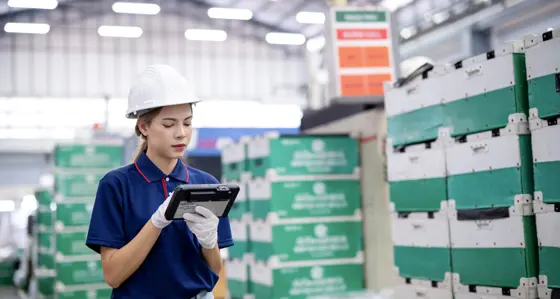
Partnership as the new leadership: Why collaboration is key to “greening” aviation
5 October 2023
Discussions about sustainability, climate change, and environmental, social and governance (ESG) frequently lead to the same conclusion – the need for collective action. Indeed, partnership as the new leadership was a recurring theme at Davos this year.
In the first article, we outlined the challenge facing the aviation sector. In this article, we will explore the role of the supply chain and encourage the industry to accelerate the transition to sustainable aviation.
Reassuringly, the technology required to produce and use SAFs is available. We’ve seen Sustainable Aviation Fuel (SAF) blended with traditional jet fuel and trialled in existing aircrafts without the need to redesign the fleet fuselage or engine design. Despite this trial reducing emissions by up to 70-80%, overall uptake remains low.
To scale SAF infrastructure and usage, investment and collaboration across the Value Chain is required – from the oil & gas majors producing and the airlines buying the fuel, to the airports, regulators and investors impacting the industry landscape.

Breaking the deadlock between supply and demand
To understand why SAFs have not taken off yet, we need to assess the cards held by players across the aviation value chain. The value chain is a complex web of stakeholders, ranging from government bodies and financial services, to airlines, airports, fuel producers and aircraft manufacturers. Each player is at a different stage in their journey to Net Zero. Yet, where SAFs are concerned, they are collectively at an impasse.
On the supply side, the uncertainty of revenue and high upfront capital costs associated with SAF development is a barrier to scaling production. Ambiguity around topics, such as the true sustainability of feedstocks, creates uncertainty for investors considering capital allocation decisions in sustainable business, in turn avoiding the risk of stranded assets. Consequently, current levels of capital allocation into SAF projects is insufficient. This means that, whilst the SAF demand amongst airlines exists, the associated costs are still too high to secure predictable forward contracts.
As the urgency of the situation increases, so too does the need for infrastructure.
Without action and cross-industry collaboration, accountability will fall short between the ‘do-ers’ and the ‘enablers’, preventing the industry from achieving net zero.
Finding a fix: It is time for policy intervention
Policy intervention could be the catalyst to drive investors’ confidence in funding large-scale SAF projects. For example, upfront payments, forward purchasing and price floors would enable supply-side companies to increase production with guarantee of return on investment.
This policy intervention could drive increased demand for SAFs. With airlines operating on wafer thin margins, and the whole-life cost of SAFs being higher than that of traditional jet fuel, the option to pay a SAF premium poses a risk of revenue loss if not adopted by airlines globally. However, through levying additional taxes on the more polluting traditional fuel, governments could mitigate this threat to profit levels and the loss of competitive advantage by raising flight ticket prices at an industry-level.
For this to be effective, it is crucial that policy interventions are coordinated at an international level as SAFs would need to be available in both the departure and destination countries.
If successfully implemented, such measures would dismantle the barriers preventing widespread adoption of SAFs amongst airlines. This demand would drive financial institutions to invest in projects, accelerating the provision of high yield, low-cost SAFs.
Everyone has a part to play
Partnerships hold the key to this success. Stakeholder collaboration is crucial to boost both production and uptake of SAFs. Increased and faster adoption will be driven by policy intervention, and ensuring capital is accessible and affordable through financial incentives and fixtures. Economies of scale will drive down the overall cost of SAFs, while government-backed financial initiatives such as upfront payments, forward purchasing and price floors would give fuel manufacturers the confidence to increase production.
Throughout this shift, the sharing of knowledge, both within and cross-industry is not to be underestimated. Communication across the aviation value chain through alliances and peer events will raise the voice of the industry in lobbying for policy intervention.
Most importantly, everyone must act. From relatively small steps, like establishing or joining an alliance, to large-scale movements such as upfront payments, forward purchasing and price floors would enable supply-side companies to increase production with guarantee of return on investment. To achieve meaningful progress in cutting emissions and slowing down climate change, partnerships must become the new leadership.
To learn more about our work driving decarbonisation in the aviation industry, please get in touch with Megan Toon, Kristin Allan or Isabella Shortman.
Our Experts

Related Insights

Your people are key to unlocking the backlog burden
Dealing with crises will always be part of the Government’s DNA – its ability to adapt rapidly and act with agility is vital. How do we address the root causes of problems to prevent them recurring and worsening backlogs further?
Read more
Driving the digital shift in health: what to watch in the 10-year health plan
At the heart of the 10-Year Health Plan lies a decisive shift from analogue to digital, putting power in patients’ hands, enabling a shift to the Neighbourhood Health Service and moving from centralised control to empowered front-line delivery. These changes are not just strategic - they are essential.
Read more
Laying the foundation: Preparing government procurement for AI integration
What foundational steps must government agencies take today to ensure AI can truly transform procurement tomorrow?
Read more
UK Spending review 2025 – impact and challenges for the public sector
Explore the 2025 UK Spending Review’s impact on public services, tech investment, and the challenges facing government departments.
Read moreRelated Client Stories

Delivering an independent evaluation for the NSW Advocate for Children and Young People
An independent evaluation of the NSW Strategic Plan for Children and Young People 2022–2024 was conducted to assess its impact and support future planning.
Read more
Improving data preparation and collection for better State Government decisions
How do you collect and translate inconsistent data from disparate systems to better inform and evaluate the impact of spend policies?
Read more
Putting a social outcomes lens over an IT RFP for an Australian government agency
How do you change how vendors see their systems, so responses align with agency outcomes and non-functional requirements?
Read more
Shifting the paradigm from projects to products – lessons from UK Home Office
Who is responsible for evolution of the services and digital products created by programmes that have ended? A question faced to all Government departments as they try to embed the principles set out in the Blueprint for a Modern Digital Government.
Read moreIs digital and AI delivering what your business needs?
Digital and AI can solve your toughest challenges and elevate your business performance. But success isn’t always straightforward. Where can you unlock opportunity? And what does it take to set the foundation for lasting success?